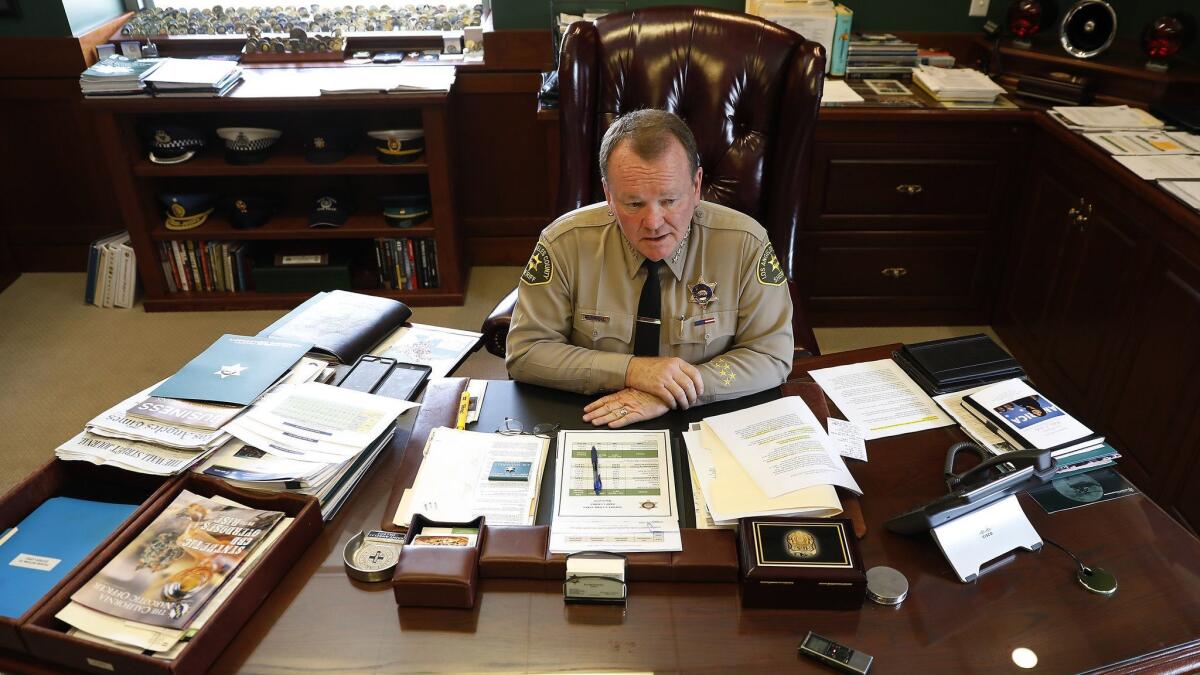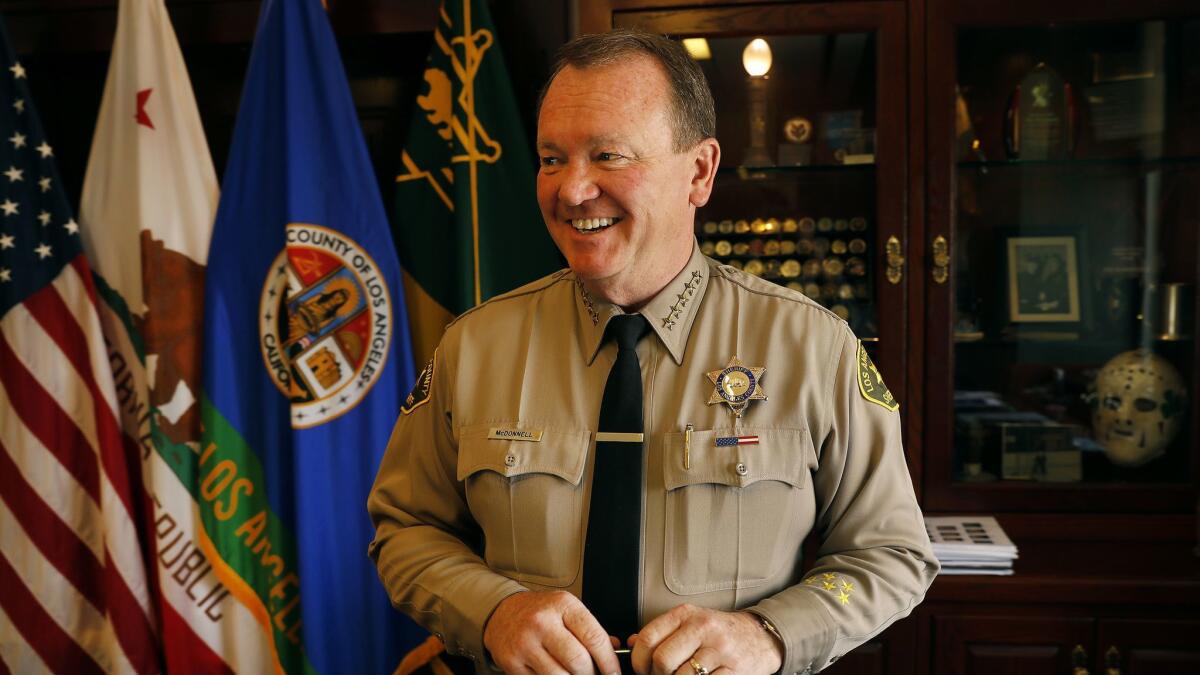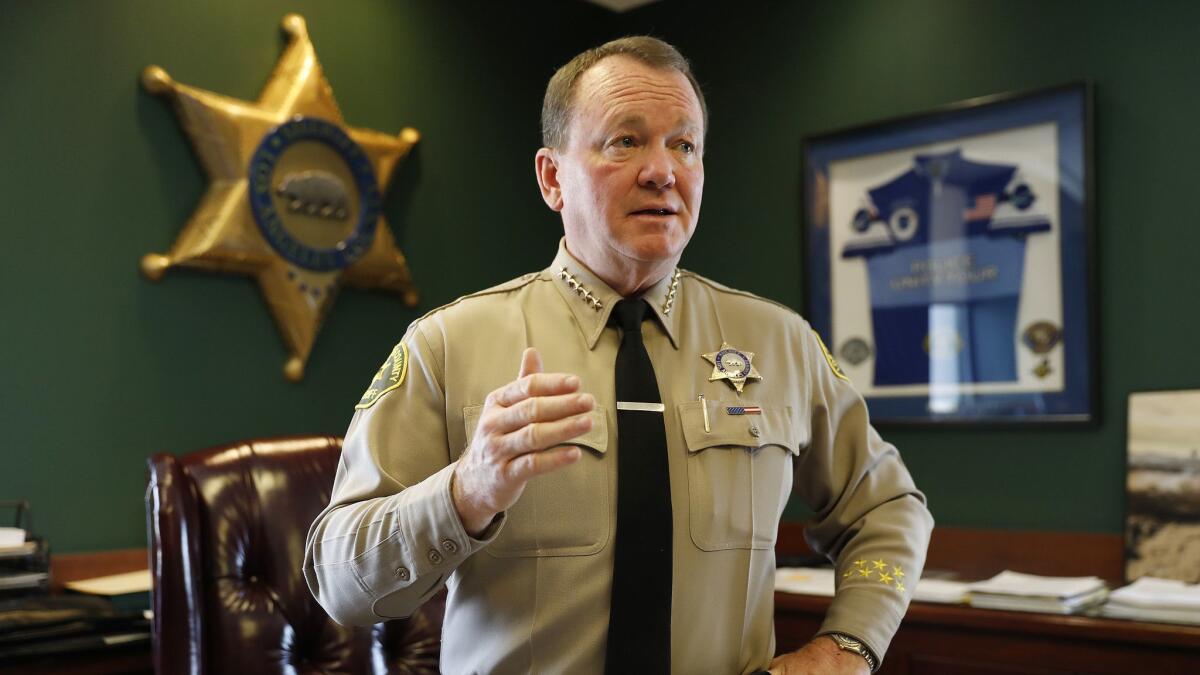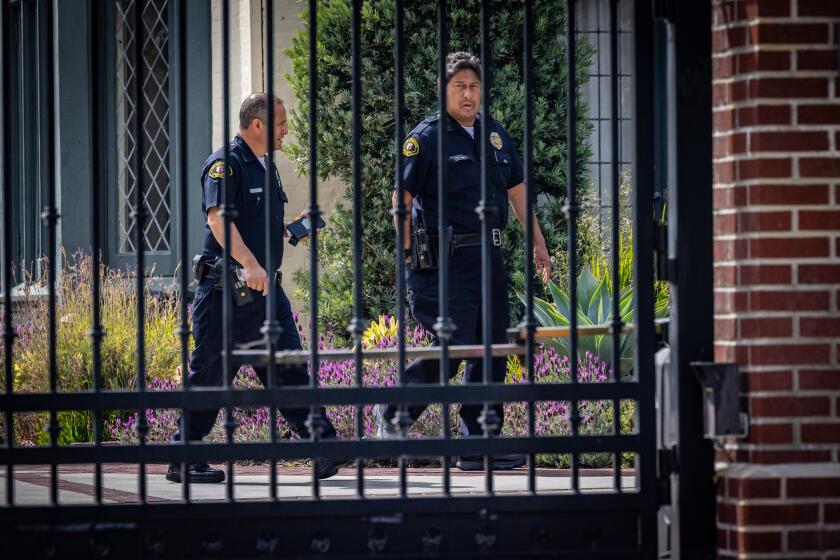Must Reads: Sheriff McDonnell inherited a department rotted by corruption. His reform effort is a work in progress

Jim McDonnell was in his first year as Los Angeles County sheriff, leading the agency after a highly publicized jail abuse scandal, when he charged his staff with an unusual request.
He wanted his department to have a theme song, like in the U.S. military, where each branch has an anthem.
Perhaps the Academy Award-winning composer Hans Zimmer, known for his orchestral scores of films like “The Lion King” and “Gladiator,” could craft a stirring tribute to the nation’s largest sheriff’s department? McDonnell’s staff approached Zimmer but ended up being offered a song by a lesser-known artist.
The episode spoke to McDonnell’s efforts to remake the image of the Sheriff’s Department in the wake of a jail corruption case that led to convictions against more than 20 officials, including his predecessor, longtime Sheriff Lee Baca.
The scandal was a dark stain on the department, leading to McDonnell’s position but also dominating his first term.
Nearly four years after becoming sheriff, McDonnell faces reelection and a reckoning over his progress in trying to improve an agency where a toxic culture allowed deputies to brutalize inmates and discriminate against black residents.
Several watchdogs, including those who’ve been critical of department policies in the past, say McDonnell has been a stabilizing presence and succeeded in improving jail conditions.
“I think he’s done a fantastic job, to be honest with you,” said Hernán Vera, a business litigator and member of the Sheriff Civilian Oversight Commission. “He inherited a department in utter chaos. The morale was super low. The leadership was really in disarray. … I think that he has gained the respect of the rank and file.”
But as the sheriff struggles to expand his 9,400-member force, the persistent vacancies mean deputies have been compelled to work overtime, a costly work-around that’s contributed to a projected $40 million deficit. Law enforcement unions say deputies are overworked and exhausted.
Some of our recommendations have been outright ignored.
— Priscilla Ocen, member of the Sheriff Civilian Oversight Commission and professor at Loyola Law School
And there’s debate about whether McDonnell has adequately embraced oversight of his department — at a time when police agencies around the nation are being scrutinized over use of force, especially in communities of color.
The sheriff is elected directly by voters, and as a result, has far fewer checks on his power than the Los Angeles police chief, who is appointed by the mayor. Incumbent sheriffs can typically count on being reelected to a job that has no term limits.
“What concerns me is he makes comments that the commission doesn’t spend enough time pointing out all the things that he is doing so well and supporting him in trying to get more funds [from the county Board of Supervisors],” said Sean Kennedy, who also serves on the oversight body and is the executive director of Loyola Law School’s Center for Juvenile Law and Policy.
“We’re not cheerleaders. We’re not a PR firm for the sheriff,” he said.
Oversight, or the appearance of it?
McDonnell, 58, was elected in 2014 on a promise of reform.
The staid Boston native, who’d spent three decades rising to the upper ranks of the Los Angeles Police Department before serving as Long Beach police chief, seemed well-positioned for the job. He’d served on the Citizens’ Commission on Jail Violence, a blue-ribbon group that issued scathing findings about rampant jail abuse and mismanagement in the Sheriff’s Department.
At his inauguration, he promised to “welcome the watchful eye of our community” and that he would strive to listen to people’s concerns before making decisions.
In late 2015, McDonnell helped create the L.A. Regional Human Trafficking Task Force, a project that combines law enforcement with social services and has rescued 250 victims. He also touts the Compton station’s participation in the Violence Reduction Network, a Justice Department-sponsored program to address issues that include gang prevention, mental illness and building community trust.
But for all those initiatives, from 2014 to 2017, crime overall increased — violent crime up 15% and property crime up 11% — in areas patrolled by the Sheriff’s Department. Crime went up each year since McDonnell took office, except from 2016 to 2017, when violent crime dipped half a percentage point and property crime dropped 3%.
Notably, homicides fell 17% — there were 175 killings in 2017, down from 210 in 2016 — partly attributed to expanded services for homelessness, mental health and drug addiction.
In a statement, the department said some of the overall crime increases could be due to Proposition 47, a measure that reduced some nonviolent offenses from felonies to misdemeanors. Sheriff’s officials have also said increases in gang violence may have contributed to the rise.
A key indicator that department reforms are working is that serious force by jailers has dropped sharply.
A rough calculation shows significant force — incidents that cause any type of injury — is down 60 percent since 2009, when it hit its highest point in nearly a decade, according to department statistics. (Starting in 2013, the agency began analyzing assaults with a different category system, so an exact year-to-year comparison isn’t possible.)
Last year, there were only three reported uses of the most severe kind of force, meaning incidents that could result in broken bones, hospitalization or death.
The department is under four settlement agreements, similar to consent decrees, relating to jail conditions and racial discrimination, all of which took effect in 2014 and 2015.
The agreements include step-by-step reforms supervised by federal court monitors. The required improvements include de-escalation training, better documentation of force, and policies that generally prohibit jailers from kicking inmates who are on the ground.
A report in March by federal court monitors overseeing the agreement on jail abuse says incidents involving the most severe type of force in the jails are “almost nonexistent.” But it also raised concerns that, because there are now more cameras in the jails, some deputies are retaliating against inmates using excessive discipline instead of physical force.
Department statistics show a rise in inmate-on-inmate assaults amid complaints that deputies may be punishing inmates by allowing them to beat each other, said Esther Lim, jails director for the American Civil Liberties Union of Southern California.
Sheriff’s Department spokeswoman Nicole Nishida said the ACLU has not informed the agency of such complaints and that allegations of deputy misconduct are taken seriously and investigated.
Jail reforms aimed at caring for mentally ill inmates and ending jail brutality will probably take several more years, said Richard Drooyan, the court-appointed lead monitor for two of the agreements targeting those issues.
“It is taking longer than I had expected,” Drooyan said.
He said the agreement focused on jail violence has required so much training and additional guidelines that after nearly three years, his team has not been able to measure the impact of the changes.
The long process could be a sign that deep changes are underway and the monitors haven’t simply been a “rubber stamp,” said Peter Eliasberg, chief counsel for the ACLU of Southern California. The organization spurred some of the jail abuse reforms by suing the department on behalf of inmates.
Eliasberg and Drooyan give McDonnell credit for largely embracing the mandates.

Kennedy, of the civilian oversight board, praises McDonnell for trying to inform prosecutors about the “Brady List,” a roster of roughly 300 deputies found by internal investigators to have lied, falsified evidence and committed other misconduct. The deputies’ unions sued McDonnell over the effort, saying he was unlawfully punishing officers who had already been disciplined. The matter is now before the state Supreme Court.
Still, some members of the civilian oversight commission complain McDonnell views the panel as a high-level suggestion box — a way for him to read the temperature on community complaints and gain support for improvements, but OK to dismiss if the advice doesn’t comport with his plans.
“Some of our recommendations have been outright ignored,” said commission member Priscilla Ocen, a Loyola Law School professor.
The panel was created out of a community outcry for a more deliberate way to engage the department over concerns. It cannot, however, force the sheriff to act on its recommendations.
Ocen was vocal in calling on the department to ground its drone, citing community concerns about surveillance and safety. The unmanned aircraft system, mostly used in search-and-rescue missions, was unveiled by McDonnell last year without public knowledge or input.
Some commissioners hoped the drone program could at least be suspended pending further discussion. But hours after the panel issued a recommendation to stop flying the drone, McDonnell said he would not comply, calling the technology “too important as a public safety tool.”
He agreed, though, to adopt some commission suggestions, such as providing detailed reports on how and when the device is used.
Kennedy said he worries that the commission “creates the impression of actual oversight” without truly being able to hold the sheriff accountable. He is among several commissioners who have said their requests for documents and information are sometimes met with delays, denials or incomplete data.
Nishida, the department spokeswoman, denied any delays and said confidential information is available to the Office of Inspector General, the “investigative arm” of the civilian board.
The inspector general, Max Huntsman, has said his office has no direct power except by persuasion.
I don’t know that there’s another policing organization, or maybe any organization, in America, that is so self-critical.
— Los Angeles County Sheriff Jim McDonnell
Other members of the civilian board said the department has been largely responsive to their concerns. Commissioner Lael Rubin, a former prosecutor, said the sheriff has embraced expanding mental health evaluation teams and other initiatives supported by the commission.
McDonnell said his department is “wide-open” to criticism from the oversight commission and the inspector general.
“I see them as a tremendous bridge for communication between our department and the multitude of diverse communities that we serve. I can’t overstate how important I believe they are to us,” he said.
Still, he emphasized that he was elected to draw on his own experiences and judgment.
McDonnell said the level of accountability within his department rivals that of other police agencies in the nation. Significant incidents are dissected: “Could we have gotten there faster? Did we deploy the right equipment when we got there? Did we operate too fast? Did we go too slow?”
“I don’t know that there’s another policing organization, or maybe any organization, in America, that is so self-critical,” McDonnell said. He acknowledged that the public often isn’t able to see and evaluate that process.
McDonnell says some of the changes he’s most proud of — an uplifted attitude within the ranks — would be difficult for others to quantify.
“It’s pride in the organization. It’s believing in the mission and doing the right thing for the right reasons because that’s what we signed on to do.”

A large department looking to expand
McDonnell has an earnest, restrained air — one who’s more likely to speak in careful paragraphs than set a room afire with jokes or rousing speeches.
His job is a big one. In addition to supervising roughly 9,400 deputies who police unincorporated areas and 42 cities including West Hollywood, Compton and Palmdale, McDonnell also runs the nation’s largest jail system. He has nearly as many officers as the Los Angeles Police Department, but a larger overall staff of 16,000 and budget of $3 billion. (The LAPD employs 13,000 people and operates on $1.5 billion).
McDonnell says his operation is extremely lean and “an amazing deal for the taxpaying public” because his deputies serve a wider area (4,000 square miles) in a more populous county (10 million people) than officers in most big-city police departments.
Yet like many police leaders across the country, he struggles to attract enough candidates — a problem that rankles existing deputies because they’ve been forced to work overtime, which has in turn strained the department’s budget.
“I am hearing that (deputies) are tired and frustrated,” said County Supervisor Kathryn Barger, who represents the northeastern part of the county including the Antelope Valley and is married to a retired deputy. She has supported measures to boost hiring.
To help close a $40 million budget gap, the department plans to limit spending on services and supplies, including bulletproof vests and patrol cars.
Meanwhile, McDonnell has added 11 sworn officers to a team of recruiters who are reaching out, in part, through social media videos to fill jobs. The agency is considering hiring a marketing firm and plans to spend asset forfeiture funds to improve its website.
Despite 564 officer vacancies, the department has only been able to add a net of about 123 deputies in each of the past three years. In the most recent cycle, 415 deputies were hired but 316 left the department. A deputy union, the Assn. for Los Angeles Deputy Sheriffs, says the department needs at least 1,500 more officers to run properly.
The LAPD, which has funding for roughly 10,000 officers, has filled almost all of its slots.
Unlike officers in most city police departments, new deputies must work in the jails, which some see as a deterrent to joining the Sheriff’s Department.
ALADS president Det. Ron Hernandez said the staffing crisis is dangerous because it leads to overworked deputies whose judgment may be compromised. He said some deputies are penalized for taking a sick day when they’re not physically ill but desperately, and perhaps mentally, need a day off.
The shortage has also meant that it’s difficult for deputies to receive ongoing training because there are so few substitutes for them if they’re temporarily taken out of the field.
The staffing troubles have been a main talking point of those running against McDonnell — retired Sheriff’s Lt. Alex Villanueva and retired Sheriff’s Cmdr. Bob Lindsey. The primary is June 5.
It’s a problem McDonnell will have to correct if he wins reelection. His pitch is that his agency offers an exciting array of jobs in one of the most diverse areas in the nation, with work that’s meaningful, and complicated.
Deputies have to conduct high-speed triage of incidents that can be dangerous and fueled by alcohol, drugs or mental illness, he said.
“They have to be able to perform [under] what many would say are unreasonable expectations,” he said. “But the reality is, that’s what we do. And that’s what we signed up to do. And our people, I couldn’t be more proud of them.”
Twitter: @mayalau
More to Read
Start your day right
Sign up for Essential California for news, features and recommendations from the L.A. Times and beyond in your inbox six days a week.
You may occasionally receive promotional content from the Los Angeles Times.







